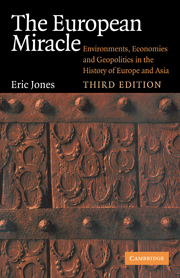Book contents
- Frontmatter
- Contents
- Preface to the third edition
- Preface and acknowledgements
- Introduction to the second edition
- Map
- EURASIA
- EUROPE
- THE WORLD
- ASIA
- 9 Islam and the Ottoman Empire
- 10 India and the Mughal Empire
- 11 China and the Ming and Manchu Empires
- EURASIA
- Afterword to the third edition
- Annotated bibliographical guide to Eurasian economic history in the very long term
- Bibliography
- Supplementary bibliographical guide
- Index
10 - India and the Mughal Empire
Published online by Cambridge University Press: 05 June 2012
- Frontmatter
- Contents
- Preface to the third edition
- Preface and acknowledgements
- Introduction to the second edition
- Map
- EURASIA
- EUROPE
- THE WORLD
- ASIA
- 9 Islam and the Ottoman Empire
- 10 India and the Mughal Empire
- 11 China and the Ming and Manchu Empires
- EURASIA
- Afterword to the third edition
- Annotated bibliographical guide to Eurasian economic history in the very long term
- Bibliography
- Supplementary bibliographical guide
- Index
Summary
I estimate the various administrations strictly from the economist's standpoint, and the conclusions I have reached are sufficiently unfavourable to suggest that the India of the seventeenth century must have been an Inferno for the ordinary man
W. H. Morelandthe economy of india was based on village agriculture. The history of the sub-continent was a fluctuating and unsettled one, yet it has been said (by M. Elphinstone, quoted by Day 1949:120) that ‘among all these changes townships remained entire, and are indestructible atoms, from an aggregate of which the most extensive Indian Empires are composed’. In India, according to Cobban (1944:125), ‘all that unites China – language, race, common civilisation, tradition of political unity – is absent’. What held this society of atomised townships together was a curiously frozen religious stratification which firmly assigned everyone his place and function. The question that first concerns us here is whether or not the underlying Indian situation prevented development, independently of any particular failings of the Mughal régime which lasted from the sixteenth to the eighteenth century.
Much potential dispute was resolved in India before it could occur, by the prior dispositions of the caste system. Whilst this was more fluid than formal descriptions of it imply, over any single lifetime it cannot have seemed anything but immobile. Caste prescribed occupation and sumptuary rights, the highest castes escaping altogether from involvement with the grime of production.
- Type
- Chapter
- Information
- The European MiracleEnvironments, Economies and Geopolitics in the History of Europe and Asia, pp. 192 - 201Publisher: Cambridge University PressPrint publication year: 2003



